Dr. Jitender Singh Chauhan
Best Onco Surgeon in Haryana
This is where Dr. Jitender Singh Chauhan steps in as one of the most trusted Gastro Surgeons and Oncology experts in Haryana, with over 15 years of experience in treating various complex gastrointestinal and oncological conditions. Dr. Jitender Singh Chauhan stands out among other specialists in Haryana due to his extensive training, compassionate care, and dedication to providing the best surgical outcomes for his patients.
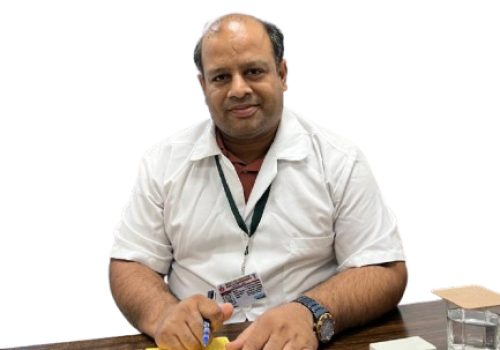
Dr. Jitender Singh Chauhan
Dr Jitender Singh Chauhan is the leading liver cancer specialist in India. He has treated hundreds of patients with liver cancers. He has more than 15+ years of experience in treating liver cancer.
Management of liver cancer involves proper diagnosis & early treatment. Diagnosis is performed with Triple phase CT scan & AFP level. The treatment involves surgery, chemotherapy, TACE, TARE or RFA.
Trusted Name
11500+ satisfied patients
Rich Experience
Having 15+ years of experience
Safe Surgical Hands
1000+ successful operations performed
Dr. Jitender Singh Chauhan experience as a esophageal cancer doctor
Dr. Jitender Singh Chauhan, a highly experienced and skilled GI cancer specialist and surgical oncologist, is based in Ambala Cantt, Haryana, India. Known for his exceptional surgical precision and compassionate patient care, Dr. Chauhan has established himself as a leading expert in gastrointestinal cancer surgeries. His expertise spans across treating complex cases involving liver, stomach, pancreas, and colorectal cancers, positioning him as one of the top oncologists in the region.
Dr. Jitender Singh Chauhan is recognized not only as a leading GI cancer specialist in Ambala Cantt, Haryana but also across the state and beyond. Known for his exceptional surgical precision, Dr. Chauhan’s expertise spans a wide array of advanced surgical techniques, tailored to achieve the best possible outcomes for patients with complex gastrointestinal cancers. His commitment to innovation and patient care ensures that his approach is both cutting-edge and minimally invasive.
Dr. Jitender Singh Chauhan’s pioneering contributions in gastrointestinal cancer surgery have established him as a leader in the field, particularly across Haryana and India. His innovative approaches to surgical interventions, combined with his vast expertise in complex GI cancer surgeries, position him as a preferred choice for individuals seeking advanced and compassionate cancer care.
Know about Food-pipe (Esophageal) Cancer
There are two types of esophagus cancer:

Adenocarcinoma: Adenocarcinoma of the esophagus arises from the glandular cells in the lower part of the esophagus.
The different locations of esophageal cancer include:
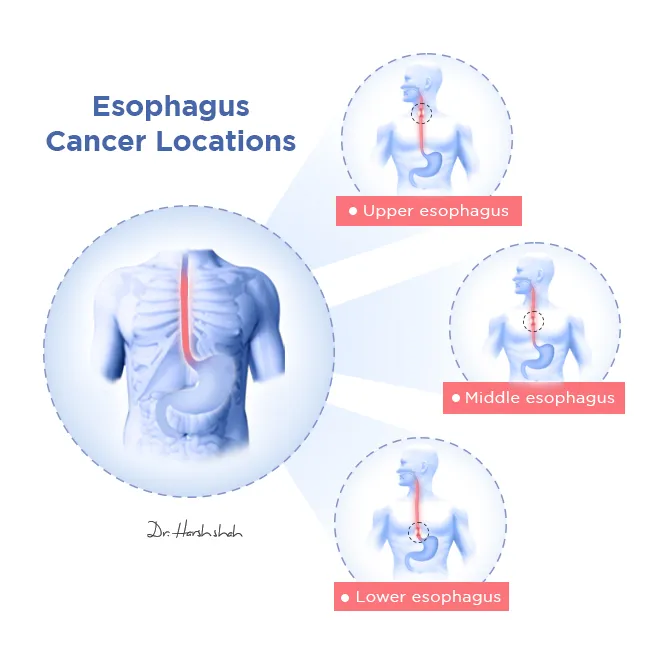
There are several types of Symptoms of esophageal cancer include:
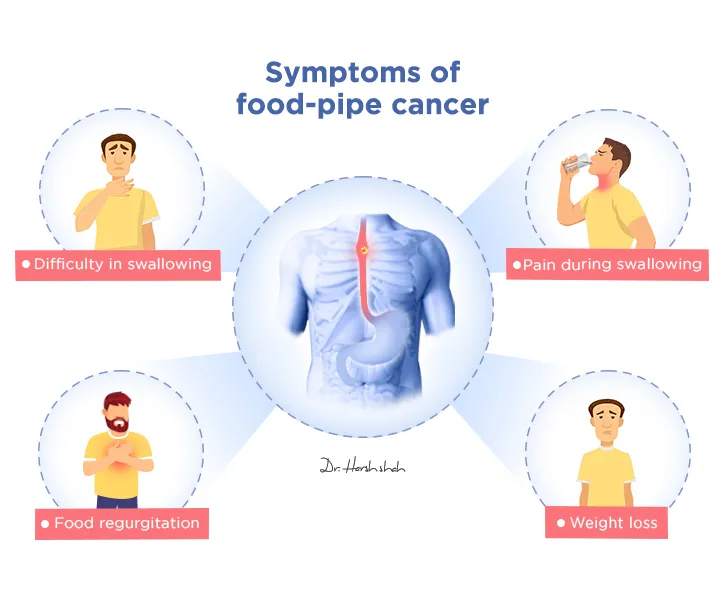
– Difficulty swallowing (dysphagia)
– Unintentional weight loss
– Persistent or worsening heartburn or acid reflux
– Chest pain or discomfort
– Chronic cough or hoarseness
– Frequent choking on food
– Painful or uncomfortable swallowing (odynophagia)
– Chronic indigestion or stomach discomfort
– Regurgitation of food or sour liquid
– Fatigue or weakness
There are three major treatments for food-pipe cancer include:

Surgery: Surgical removal of the cancerous tissue is a common treatment approach. This may involve removing a portion of the esophagus (esophagectomy) or, in more advanced cases, removing the entire esophagus (total esophagectomy).
Radiation therapy: High-energy X-rays or other types of radiation are used to kill cancer cells and shrink tumors. Radiation therapy may be used before surgery to shrink tumors, after surgery to kill remaining cancer cells, or as the primary treatment in certain cases.
Chemotherapy: Anti-cancer drugs are administered to destroy cancer cells. Chemotherapy can be used as a standalone treatment or in combination with other treatments, such as surgery or radiation therapy.
Latest technologies to treat Esophageal cancer
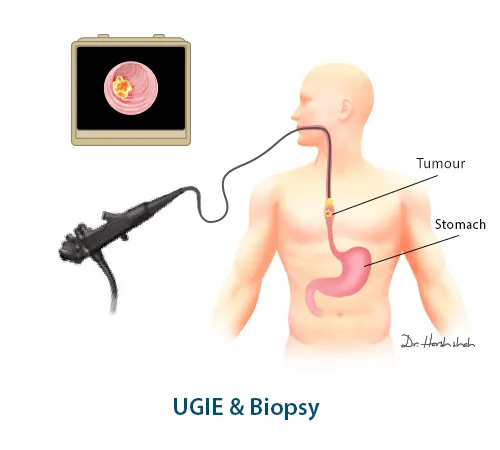
UGIE & Biopsy:
UGIE stands for Upper Gastrointestinal Endoscopy, a procedure used to visualize and examine the upper digestive tract, including the esophagus, stomach, and duodenum. During UGIE, a flexible tube with a camera (endoscope) is inserted through the mouth to obtain detailed images and diagnose conditions such as ulcers, tumors, or inflammation. Biopsy, a common part of UGIE, involves the collection of tissue samples for further examination and testing.
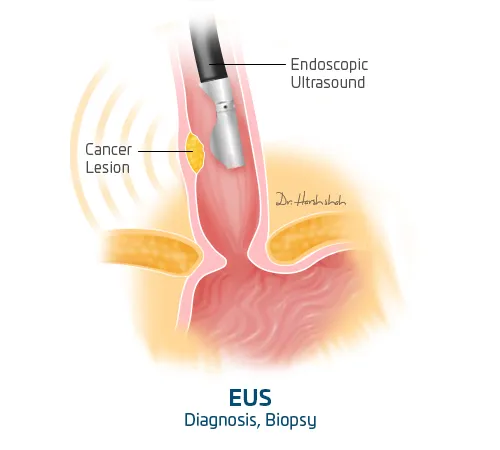
EUS (Diagnosis, Biopsy):
EUS refers to Endoscopic Ultrasound, a minimally invasive procedure combining endoscopy and ultrasound to visualize and diagnose conditions in the gastrointestinal tract. EUS provides high-resolution images and enables physicians to examine the walls of the digestive tract and nearby organs. It is particularly useful for evaluating tumors, staging cancer, and assessing the depth of invasion. EUS can also be used to perform biopsies, obtaining tissue samples for analysis and diagnosis.
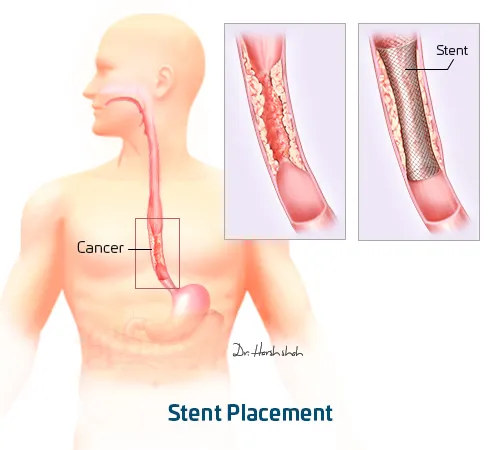
Stent placement:
Stent placement involves the insertion of a small, expandable tube (stent) into a narrowed or blocked passageway in the body. Stents are commonly used in the gastrointestinal tract to open up narrowed areas, such as the esophagus, bile ducts, or colon. The stent acts as a scaffold, keeping the passageway open and allowing for the normal flow of fluids or substances. Stent placement can provide relief from symptoms, restore proper function, and alleviate complications caused by obstructions or strictures in the gastrointestinal system.
Why Choose Dr. Jitender Singh Chauhan?
Dr. Jitender Singh Chauhan, a highly experienced and skilled GI cancer specialist and surgical oncologist, is based in Ambala Cantt, Haryana, India. Known for his exceptional surgical precision and compassionate patient care, Dr. Chauhan has established himself as a leading expert in gastrointestinal cancer surgeries. His expertise spans across treating complex cases involving liver, stomach, pancreas, and colorectal cancers, positioning him as one of the top oncologists in the region.
Dr. Jitender Singh Chauhan, a highly respected onco surgeon in Haryana, leads a dedicated and expert team at his practice. Working alongside experienced medical oncologists, radiation oncologists, and interventional radiologists, Dr. Jitender Singh Chauhan provides comprehensive care for patients dealing with various cancers.
Dr. Jitender Singh Chauhan, a highly esteemed onco surgeon in Haryana, is renowned for his expertise in managing advanced stages of cancer, including the complex treatment of stage 4 cancers. With a focus on gastrointestinal (GI) cancers, Dr. Chauhan’s practice provides a wide range of cancer care services, including chemotherapy and surgical interventions.
Frequently Asked Questions
The survival rate for esophageal cancer varies based on factors such as stage, overall health, and treatment. Generally, the 5-year survival rate ranges from 20% to 30%.
Esophageal cancer is treated by a team of doctors, including surgical oncologists, gastroenterologists, medical oncologists & radiation oncologists.
Treatment options for esophageal cancer include surgery, radiation therapy, chemotherapy, targeted therapy, immunotherapy, and palliative care. The specific approach depends on the stage and individual factors.
Esophageal cancer can be curable, especially if detected early. The potential for a cure depends on factors such as the stage, location, and overall health of the patient.
The last stage of esophageal cancer, stage 4 or advanced/metastatic cancer, indicates spread to distant organs or lymph nodes. Palliative care focuses on symptom relief and improving quality of life.
The success rate of robotic surgery for cancer varies depending on factors such as cancer type, stage, surgeon expertise, and patient health. It has shown promising results in terms of improved outcomes and reduced complications.

